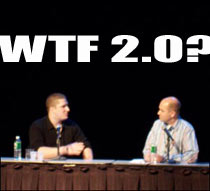Weekend Brainfood: Visions of the Future
Posted by Justin Boland on Mar 01, 2008 | 0 Comments
 Here’s a quick recap of the shocking revelations you already knew: DRM failed, new media is going to stick around, torrents cannot be killed, old record labels need to adapt to the internet, and this “social networking” stuff might be useful. Ars Technica’s headline for this week was “Music 1.0 is Dead”-not saying they’re naive, they recognized that the real news here is that the industry is admitting they lost the battle, the war and most of their fans, too.
Here’s a quick recap of the shocking revelations you already knew: DRM failed, new media is going to stick around, torrents cannot be killed, old record labels need to adapt to the internet, and this “social networking” stuff might be useful. Ars Technica’s headline for this week was “Music 1.0 is Dead”-not saying they’re naive, they recognized that the real news here is that the industry is admitting they lost the battle, the war and most of their fans, too.
This entire article-and the DIY music community as a whole-owes a big debt to the Wired blog Listening Post for their ongoing, detailed coverage of the conference. They made a very expensive industry shindig into something much more accessable, so I want to give a big broke THANK YOU to Eliot Van Buskirk.
Doug Perlson, CEO of TargetSpot

Please note the fine print: the precise question was “have you ever listened to a podcast” so these figures don’t reflect repeat audience.
This was a real wake-up call for yours truly. I was just sketching out an article earlier this week about the vast Gaping Maw of bored people online-there’s a huge demand for entertainment media, and I’ve been slacking on identifying the major audiences and sources for that. We’re working on podcast-style content for World-Around Records artists, and for anyone else engaged in the same project, I recommend James Curcio’s recent tutorial on Alterati.
“Targeting music promotions on internet radio is surprisingly new, but it has limitless opportunities for targeting by content and other factors. There’s been a dysfunctional relationship between labels and radio, historically. Spending without having-I’ll say it-some sort of quid pro quo [ed. note: payola], which doesn’t exist anymore”¦ it’s harder for them to recognize the promotional value.
I wouldn’t recommend that anyone spend their money, even a small budget, on any one thing. For music, search advertising is probably the weakest option. With social networks, it’s not about the network, it’s about the individual. You can reach that same individual through three social networks in three different ways, because they use those networks for different things.”
Shahi Ghanem
 “The most exciting thing I’ve seen in online marketing is the consumer. The fan. The person who becomes the marketing engine for you online, and you turn the pyramid around. Through this interactivity, we’re able to start with the fan and let them become a thousand. That’s the single most influential thing ““ after that, it’s just a matter of which technology to use.
“The most exciting thing I’ve seen in online marketing is the consumer. The fan. The person who becomes the marketing engine for you online, and you turn the pyramid around. Through this interactivity, we’re able to start with the fan and let them become a thousand. That’s the single most influential thing ““ after that, it’s just a matter of which technology to use.
We had users come in and create a new chapter for a Pink video that was distributed around the web. As a marketer, I can buy web ads”¦ if they’re done well, you get a half a percent click-through. Or you can do search, but it’s hard to base your entire online strategy around search. So we got people who were already talking about Pink to make these videos, and tons of people used it and passed it around social networks, blogs, etc. We can tell a client the top cities and social networks in which the campaign worked. Without the virality, it would have cost 10-12 times as much, even if it was an effective banner ad campaign.”
Thomas Hesse of Sony/BMG
I already quoted Thomas Hesse earlier this week, in my article on the environmental impact of the record biz. Hesse went into a pretty surprising amount of depth, and I’d like to share an excerpt that jumped off the page for me. It’s a great insight into the “portfolio” mentality that’s driving successful artists right now-thinking in terms of “assets” rather than simply albums and singles. It’s also a good reminder of why Justin Timberlake is running circles around his competition: just plain work ethic.
“Music videos have become a significant revenue driver. Video downloads on iTunes are a small factor but growing rapidly. With Apple TV, there will be more video sales, and people will want those videos to keep, especially in high-quality formats.
We’re making money on user-generated videos and our music videos. We’re aggressive in building revenue streams there”¦ It’s all part of a bigger picture. Every single asset we create is a revenue generating asset, and we create more assets than we ever did before. We’re pushing that content to phones and other new places. With Justin Timberlake, there are more than 100 assets for an album, which we sell through different channels. As you can imagine, it’s a Herculean task to deal with these new products.”
I would suggest it’s only a “Herculean task” to manage all of these assets simply because it’s a very new trick being forced upon some very elderly canines. If you, the driven and visionary DIY entrepreneur reading this, build your system to accomodate an “asset” mentality, you’ll be years ahead of your better-financed competition. This is just a matter of simple organization-and there’s no excuse for being disorganized in 2008.
And last but not least…
PLEASE HELP ME UNDERSTAND THIS
One of our primary goals at World-Around Records is better understanding our fans. Data is the lifeblood of the music business, and if you haven’t already read it, I strongly suggest you read Bruce Warila’s article “A New Model for Record Labels.” Nearly every single speaker at the Digital Music Forum East kept hammering home the importance of demographics and data, so when I read the quote above, it really fried my brain.
Especially considering who said it: Glenn Otis Brown, who is a “Strategic Partner Developer” at none other than YouTube.
Can anyone reading this help me understand? Does this really mean that the music and film industries are actively turning down a treasure trove of vital demographic information? It sounds insane, and surely it’s more complex than that…right?
New Forum
In other news, we’ve moved the Audible Hype forums to a sexy new location. It’s not pretty, but it sure is functional…lots more brainfood there.
